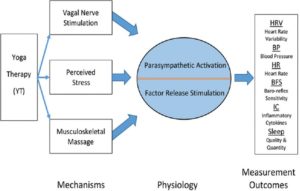Yoga Practice is a Safe and Effective Treatment for Patients Recovering from Heart Failure
By John M. de Castro, Ph.D.
“With heart failure rates accelerating alongside other cardiovascular diseases in our society, the need for a medically effective and cost-effective solution is more pressing than ever. Fortunately, in addition to its broad range of heart-related health benefits, yoga offers an inexpensive solution for those who may not be able to afford regular treatments for their condition.” – Melinda Gosvig
Cardiovascular disease is the number one killer, claiming more lives than all forms of cancer combined. “Heart disease is the leading cause of death for both men and women. About 610,000 people die of heart disease in the United States every year–that’s 1 in every 4 deaths. Every year about 735,000 Americans have a heart attack.” – Centers for Disease Control. Congestive heart failure (CHF) is a major type of cardiovascular disease. “CHF is a chronic progressive condition that affects the pumping power of your heart muscles. While often referred to simply as “heart failure,” CHF specifically refers to the stage in which fluid builds up around the heart and causes it to pump inefficiently” (Healthline).
There are myriads of treatments that have been developed to treat Heart Failure including a variety of surgical procedures and medications. Importantly, lifestyle changes have proved to be quite effective. These include quitting smoking, weight reduction, improved diet, physical activity, and reducing stresses. Contemplative practices, such as meditation, tai chi, and yoga, have also been shown to be helpful for heart health. In addition, mindfulness practices have also been shown to be helpful for producing the kinds of other lifestyle changes needed such as smoking cessation, weight reduction and stress reduction.
In today’s Research News article “Yoga for Heart Failure: A Review and Future Research.” (See summary below or view the full text of the study at: https://www.ncbi.nlm.nih.gov/pmc/articles/PMC5934956/ ), Pullen and colleagues review the published research literature on the effects of yoga practice on heart failure patients. They found that the published randomized clinical trials report that yoga practice improves cardiac function, and exercise capacity and reduces body weight, depression, blood pressure, and markers of inflammation in heart failure patients. Hence yoga practice helps with the physical and psychological well-being of patients with heart failure.
The authors postulate that yoga has these benefits as a result of its ability to reduce stress responses. This in turn increases the activity of the calming parasympathetic nervous system which, in turn, reduces heart rate, blood pressure, inflammatory responses, and physiological arousal in general. In this way the practice of yoga is thought to be beneficial for the patients. Hence, yoga practice calm the physiology allowing the patient to strengthen and heal.
So, they report that yoga practice is a safe and effective treatment for patients recovering from heart failure.
“yoga can help lower blood pressure, increase lung capacity, improve respiratory function and heart rate, and boost circulation and muscle tone. It can also improve your overall well-being while offering strength-building benefits.” – M. Mala Cunningham
CMCS – Center for Mindfulness and Contemplative Studies
This and other Contemplative Studies posts are available on Google+ https://plus.google.com/106784388191201299496/posts and on Twitter @MindfulResearch
Study Summary
Pullen, P. R., Seffens, W. S., & Thompson, W. R. (2018). Yoga for Heart Failure: A Review and Future Research. International Journal of Yoga, 11(2), 91–98. http://doi.org/10.4103/ijoy.IJOY_24_17
Abstract
Background:
Complementary and alternative medicine is a rapidly growing area of biomedical inquiry. Yoga has emerged in the forefront of holistic medical care due to its long history of linking physical, mental, and spiritual well-being. Research in yoga therapy (YT) has associated improved cardiovascular and quality of life (QoL) outcomes for the special needs of heart failure (HF) patients.
Aim:
The aim of this study is to review yoga intervention studies on HF patients, discuss proposed mechanisms, and examine yoga’s effect on physiological systems that have potential benefits for HF patients. Second, to recommend future research directions to find the most effective delivery methods of yoga to medically stable HF patients.
Methods:
The authors conducted a systematic review of the medical literature for RCTs involving HF patients as participants in yoga interventions and for studies utilizing mechanistic theories of stretch and new technologies. We examined physical intensity, mechanistic theories, and the use of the latest technologies.
Conclusions:
Based on the review, there is a need to further explore yoga mechanisms and research options for the delivery of YT. Software apps as exergames developed for use at home and community activity centers may minimize health disparities and increase QoL for HF patients.
https://www.ncbi.nlm.nih.gov/pmc/articles/PMC5934956/
